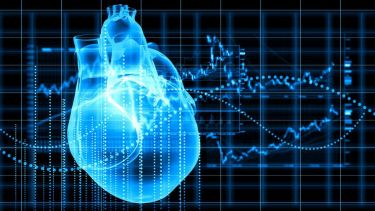Researchers will build and evaluate replicas of patients’ hearts online to find out if they provide better monitoring and ultimately better care.
The team working on the £8m CVD-Net project will design and build fully accurate virtual copies – ‘digital twins’ - of participants’ hearts from health data, including medical records, hospital scans and information from wearable and implanted monitors.
Over time, these will be updated continuously by real-time data from either patient-implanted or wearable medical devices. The research team hope the digital twin hearts will allow them to accurately track changes to each patient’s disease progression and responses to treatment, as well as enabling personalised predictions.
The patients all have pulmonary arterial hypertension (PAH), a life-threatening cardiovascular disease which causes severe breathlessness, heart failure and recurrent hospitalisation. Participants in the study will come from specialist PAH centres including Imperial College Healthcare NHS Trust and 91÷±≤• Teaching Hospitals. The, headed by Professor Martin Wilkins, will co-ordinate the study for Imperial College Healthcare.
The project is led by Professor Steven Niederer at Imperial College London, working with the University of 91÷±≤•, University of Nottingham and the Alan Turing Institute. The interdisciplinary team of engineers, clinicians, computational statisticians and research engineers will collaborate to access the necessary data, build the digital infrastructure and work closely with patients, doctors and stakeholders to evaluate its usability and accuracy.
91÷±≤• brings expertise across the board for the project. From the Faculty of Engineering, Professor Richard Clayton from the Department of Computer Science has a track record in cardiac modelling. Professors David Wagg and Keith Worden from the Department of Mechanical Engineering bring experience in digital twins, machine learning and computational statistics. From the Faculty of Health, Professor Tim Chico, Professor of Cardiovascular Medicine and a consultant Cardiologist at 91÷±≤• Teaching Hospitals NHS Foundation Trust, and Professor Alex Rothman, Professor of Cardiology and Honorary Consultant Cardiologist at 91÷±≤• Teaching Hospitals NHS Trust, will bring their clinical expertise to the team; 91÷±≤• is a major regional centre for treating patients with PAH. There are also excellent synergies with the EPSRC-funded South Yorkshire Digital Health Hub, Insigneo and the Centre for Machine Intelligence.
Professor Richard Clayton, Professor of Computational Physiology in the Department of Computer Science at 91÷±≤• said: "This programme grant presents a fantastic opportunity to bring digital health technology into the clinical setting, and so is a real opportunity to make a tangible difference to the lives of patients with pulmonary arterial hypertension."
The (EPSRC) is supporting the project with funding of £8m. Research at Imperial College Healthcare is also supported by funding from the National Institute for Health and Care Research (NIHR) Imperial Biomedical Research Centre.
The digital twin is a concept from engineering and manufacturing, where a real-time virtual counterpart of a physical entity, such as a jet engine or process, is used for monitoring and improvements. Because there is a two-way data interaction between the real entity and virtual replica, the digital twin accurately reflects changes over time. In medicine, a digital twin can be a copy of a real patient, an organ, or a biological process, but as yet the technology isn’t widely used.
Professor Steven Niederer, Chair in Biomedical Engineering at the at Imperial College London, and Co-Director of Digital Twins at the Alan Turing Institute, says: “We want to use this technology to better forecast when patients are likely to feel better or worse, or likely to have a health problem, or when their medication is working and when it isn't. We hope it will allow us to be more receptive and responsive while also reassuring this critically ill group of patients.”
He added: “We believe this is the first time scientists are investigating and trialling the use of digital twin technology for the NHS for a real patient group, at a reasonable scale, and evaluating whether it will provide better care.”
Ultimately the project will also assess whether the use of digital twin heart models in NHS patient care pathways is feasible, scalable and affordable.

